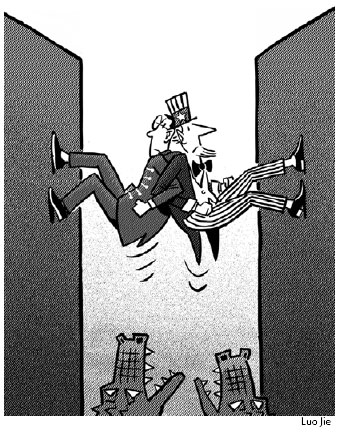This dialogue promises to be different

Casual observers could be forgiven for wondering what the China-US Strategic and Economic Dialogue (S&ED), which began in Washington yesterday, means or if it would yield any desired result at all.
The S&ED replaces the Strategic Economic Dialogue as a top-level dialogue to facilitate progress on bilateral and other urgent issues. But how can the addition of an "and" to the name result in a major difference? And how can it do its job without stepping on the toes of the at least 56 other bilateral forums already in place?
Cynics may say high-level political dialogues rarely yield more than broad statements of goodwill, which deliver very little in the way of concrete, workable change. And though they may play an important role in international diplomacy, they are often found wanting when it comes to on-the-ground delivery.
But it would be a mistake to underestimate the potential of the S&ED to drive change, especially because one of the figures behind it is the US president. Barack Obama has consistently outperformed expectations. He was not the favorite to win even the Democratic primaries, let alone the US presidential election. His early lead in the election was expected to wither away after his "fresh new appeal" wore off.
After assuming office, he has been working toward achieving his ambitious objectives, ignoring cynics' fear of failure. And he has a team of high-performing people who seem to share his belief.
But it isn't just the US that sees opportunity in the new bilateral forum. President Hu Jintao's personal involvement is surely a sign of China's commitment to a new working relationship with the US administration.
All signs point to the fact that the US-China Strategic and Economic Dialogue is being taken seriously. But what, exactly, is on the agenda?
Much will be dictated by how ambitious the leaders of both sides choose to be - and, as ever, how well they get along on a personal level. But despite the presence of a number of issues that have been on the agenda for many years, early signs show this will not be a "business-as-usual" dialogue.

For one thing, there's the economy. The global downturn has had a major impact on the two countries and their bilateral ties. China will be eager to seek assurances that its investment in US Treasury bonds is safe, and it has already indicated its desire to protect the value of the dollar, though it has begun discussions on possible alternatives to the greenback as a global reserve currency.
There will be many incentives to discuss the two countries' strategies to help their economies recover. Performance and reform of several hard-hit industries, as well as the impact of US and Chinese stimulus packages, are likely to provide further fuel for discussion.
Trade is another topic on the agenda. Recession often shifts the focus to trade issues, and China's still-growing economy still attracts foreign companies hit hard by the global downturn at home. Both countries face protectionist sentiments and pressure to "buy national", too. The US trade deficit could be an issue, as could be the fact that much of China's economy is still fuelled by exports.
And finally, the countries may find a mutual interest in reviving the Doha Round of WTO talks.
The most unusual outcome of the S&ED, however, may be in the field of energy and environment. Trying to shift the US' dependence on non-renewable energy by promoting a cap-and-trade scheme for emissions was one of Obama's first and most high profile moves. China has already identified the need to embrace renewable energy and encourage energy efficiency.
The past six months have seen both countries make progress in this area. Energy-related issues are a significant component of any country's economic equation. But recent times have seen them collide with a growing awareness of - and concern for - the environment, and that has made them politically strategic.
With less than five months to go for the UN Conference on Climate Change in Copenhagen, it would make sense for the US and China to address the issue in the context of the S&ED. In absolute terms, they are still the biggest greenhouse gas emitters, and until they take the initiative, it will be difficult to achieve any sort of progress at the global level.
US officials say that is exactly what could happen. US Secretary of State Hillary Clinton is said to be particularly interested in securing a bilateral agreement in this area. Some officials have even suggested it could be her primary focus at the dialogue.
It cannot be said for sure whether her Chinese counterparts will agree to the inclusion of this issue on the S&ED agenda, but given the current government focus on energy efficiency and renewables -- and the speed with which China's domestic renewable energy industry is growing -- it is far from being impossible.
A US-China deal focused on technology transfer, increased use of renewable energy, promotion of energy efficiency and other key policy priorities would certainly set the S&ED apart from earlier forums and mark the beginning of a new era of Sino-US cooperation. It would energize the global discussion on climate change, too, and would send a clear message to other countries about the urgency to address this issue.
The impact on business could also be significant. Energy remains an important factor for most companies. Energy costs have been rising steadily over the past several years (the recent drop in oil prices, notwithstanding), and the US Energy Bill, if the Senate passes it, will impose a number of measures which will give more incentives to business to reduce their energy use.
Similarly, many businesses understand that their clients want to feel good about their purchases. Environmentally and socially responsible products used to be made for a niche market. But those criteria are increasingly becoming mainstream requirement.
Undoubtedly, the S&ED is just the beginning of what will be a long-term process covering many issues. And its outcome will set the agenda for Sino-US political and economic ties for at least the next few years. For the first time, a strategic and economic dialogue could see concrete action on the environment and energy - and in today's climate, few things are of greater strategic importance than that.
The author is senior vice-president of Fleishman-Hillard, based in Beijing. He has been a political analyst in North America, Europe and India
(China Daily 07/28/2009 page9)














